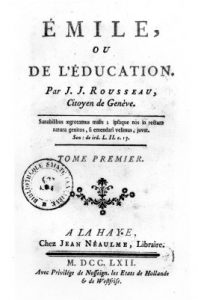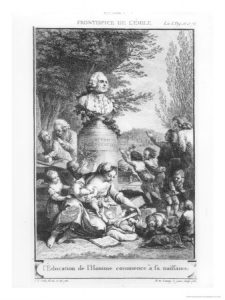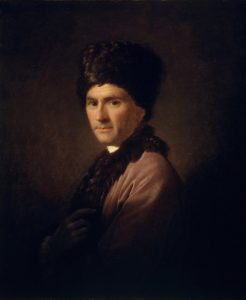Émile, or Treatise on Education (Émile, ou De l’éducation) 1762)
“Sophie ought to be a woman as Émile is a man—that is to say, she ought to have everything which suits the constitution of her species and her sex in order to fill her place in the physical and moral order” – Émile
Émile, or Treatise on Education (Émile, ou De l’éducation) was an essay written by the French enlightened philosopher Jean-Jacques Rousseau (1712-1778) that discussed what he envisioned as the ideal life and education of a young boy named Émile. With the help of his tutor, Émile is taught to be self-governing, choosing his own path and determining his own fate. The last book in the series describes a young girl named Sophie who is his perfect match. Sophie is educated to be governed by her husband. This essay highlights Rousseau’s philosophy of the importance of education, nature-based gender roles, and how education should differ between men and women.
Jean-Jacques Rousseau was born in Geneva, Switzerland in 1712. In 1742 he moved to Paris, France where he would become an influential writer and philosopher. He wrote many popular books ranging from fiction to political theory. He espoused a number of controversial ideas, including that education be used as a way to bring out the positive qualities of individuals. While Rousseau had strong opinions on the gender-specific roles of men and women in society, Rousseau himself never found his perfect match. As a result, the character Sophie was based on what he perceived to be the ideal woman rather than a woman that he loved.
Émile is a series of five books that describe Émile’s upbringing and education. The first three focus on Émile’s childhood and the fourth focuses on his adolescence. The last book describes the upbringing of his perfect companion, Sophie. Due to Rousseau’s criticisms of civilization and school education, Émile is educated alone by a tutor rather than in a school with other boys. This is to encourage his natural talents and help him develop his natural reason as a way to direct his passions rather than suppress them.
In Book III, Émile furthers his education by learning science and reasoning. In this book he also reads Defoe’s Robinson Crusoe to further motivate his interest in the sciences. This book clearly emphasizes Rousseau’s belief that men are to be taught reasoning so that they may become self-governing, free individuals. In contrast, Book V, on Sophie’s upbringing and education, suggests a much different education for her and other women. This final book in the series emphasizes Rousseau’s belief that women are to be educated to be obedient and that their virtue will determine what kind of man they will marry.
Book V begins by asserting that women and men are built in the exact same fashion, making them identical in almost all ways. However, he argues, their sexual characteristics are completely different, making it useless to compare them as equals. Thus, everything that men and women have in common is due to their shared species while everything that is different is related to their respective sexes. As a result, men and women have different roles in nature that could not be fulfilled if they were identical in the eyes of society. For Rousseau, both roles—the “active and strong” men and the “passive and weak” women—are of equal importance.
According to Rousseau, women were created to please men and should therefore be agreeable, avoiding any assertion of authority whatsoever. With a proper education, women are to be taught to value of purity and to find themselves men with good morals. Otherwise, women will try to use sexual favors to control men, even though she does not have the “authority” to do so. Likewise, it is important that men marry women of lower social classes. Otherwise the woman, thinking she holds the authority in the relationship, will act as a tyrant and make the man look like a fool. Finally, because women manipulate men using caresses and tears, they need to be educated on moral decency. Finding a balance between undereducated woman who cannot guide their children to virtue and over-educated women who will be disdainful of her feminine duties, he argues, is key. Men should also avoid marrying women who are too beautiful because they make for unhappy husbands. If a man’s wife is more beautiful than he is, she will receive an excessive amount of attention from other males thus is more likely to be unfaithful.
It is evident that while Rousseau believed that both men and women should be educated to reach their full potential, he suggests a system that reinforces their gender differences. Under this system, women are to be educated to submit to men and men are to be educated as authoritarians. While, according to Rousseau, these traits may be innate, education will teach the sexes how to fully embody their roles in society.
Jean-Jacques Rousseau’s Émile or Treatise on Education remains relevant today. The theories and beliefs of Enlightenment philosophers such as Rousseau played a big role in shaping the beliefs of the public at the time, particularly when they were able to distribute their ideas on paper. Without written documents such as this one, it would be impossible to know understand their impact on society and, more broadly, on how the idea of nature-based gender and separated spheres have evolved to what they are today.
Thelma Bost, Interdisciplinary Perspectives in Global Public Health, Class of 2020
Sources
Literature and Websites
- DiCaprio, Lisa, and Merry E. Wiesner, eds. “Chapter 7 Early Modern Religious and Intellectual Development.” Lives and Voices: Sources in European Women’s History, 248-251. Boston: Houghton Mifflin, 2001.
- Dowling, Wyatt James. “Science, “Robinson Crusoe”, and Judgment: A Commentary on Book III of Rousseau’s “Emile”.” Order No. 3301787, Boston College, 2007.
- Goodman, Bridenthal, Renate, Susan Mosher Stuard, and Merry E. Wiesner. “Dena, “Women and the Enlightenment.”Chapter 9 Women and the Enlightenment.” In Becoming Visible: Women in European History, ed. Renate Bridenthal, Susan Mosher Stuard, and Merry E. Wiesner, 233-260. 3rd ed. Boston: Houghton Mifflin Company, 1998.
- Rousseau, Jean-Jacques. Émile, ou de l’éducation (Emile, or On Education) Paris 1762.
Images



